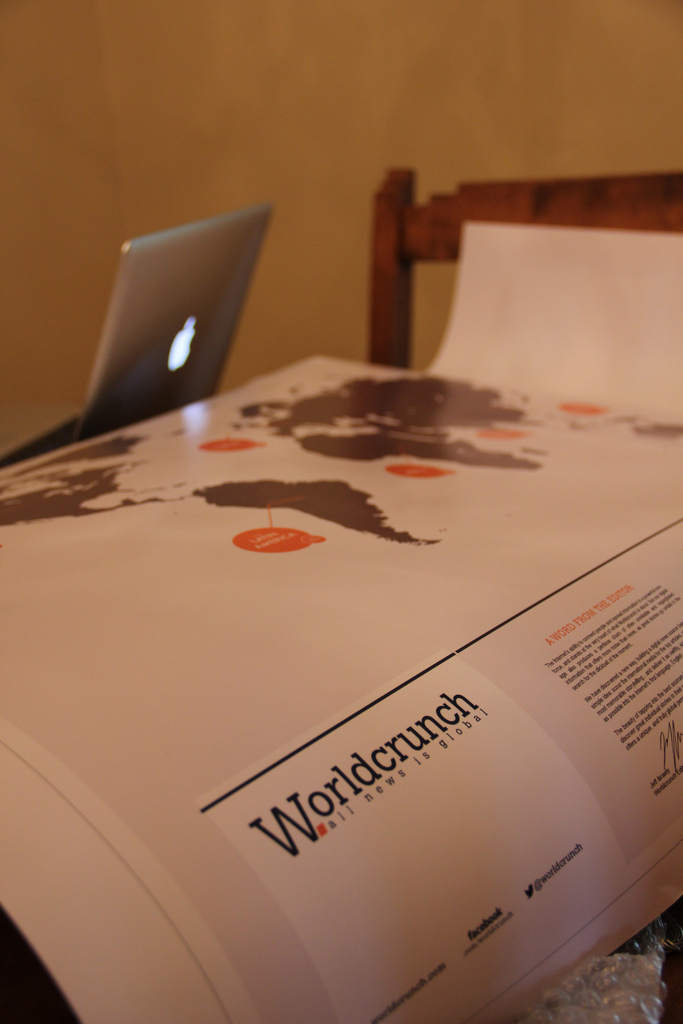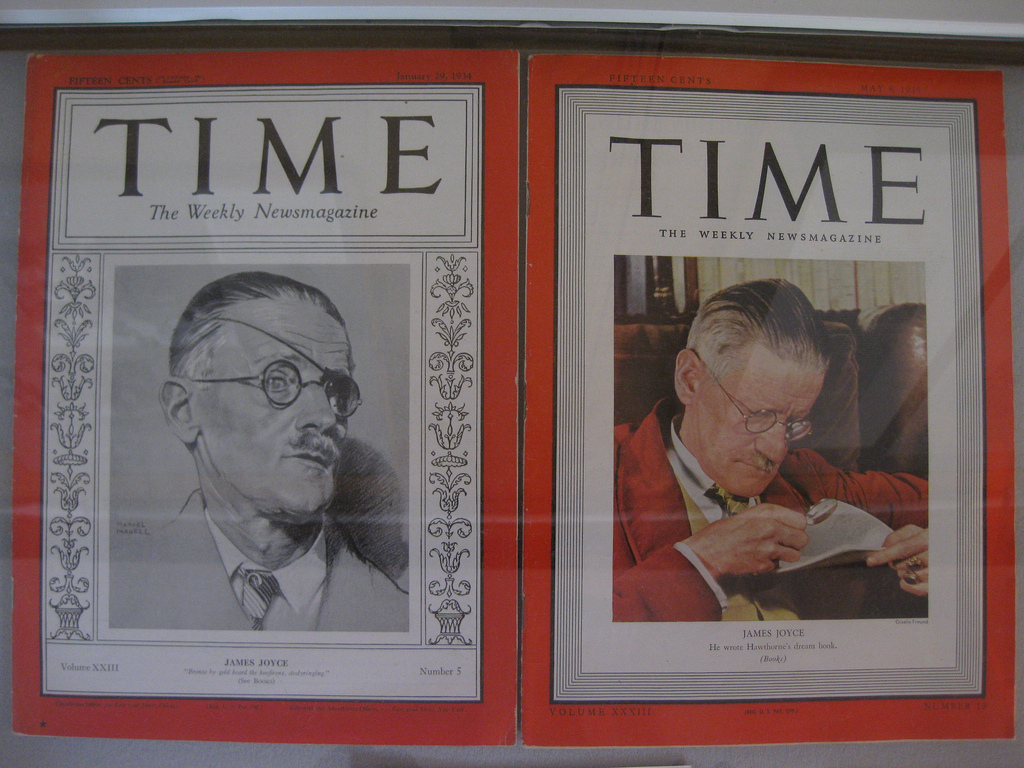Out of Time

“Hopefully this article is going to be more feature than investigative,” muses Jeff Israely.
On a Tuesday afternoon in the beginning of October, Israely sits on a leather couch in his small, rather sparsely furnished, yet tidy boardroom in the 11th arrondissement of Paris, twirling his thick framed tortoise glasses around his index finger.
He leans back, crossing one leg over the other. “Just trying to figure out how I should respond.”
It’s around 12:30 p.m. and the afternoon sunlight is filtering through Rue Amelot. A hazy beam of light streams through the large bay window and illuminates small dust particles suspended in the turbid air between us.
There is a vaguely familiar, somehow homey quality to the air in the room — stagnant and relaxed, yet concentrated – unlike what one might assume in a bustling newsroom.
The sounds of Parisian traffic float up to the fourth floor from the street below, the sharp whistle of an ambulance siren interrupts the hushed tranquility of the office at lunchtime. The work day seems to have taken a brief pause, and mismatched teacups are still perched on desks.
Isrealy settles onto the boxy black leather couch that’s tucked in the corner of the room. A turquoise sign hangs above his head, not quite centered above the couch, in a way that’s irritating yet comforting. It reads, “Life’s a journey – complete it!”
As a former Time magazine bureau chief with three decades of experience, Israely launched his own digital startup, Worldcrunch, in 2011. Today, it works with a local team of six to eight employees with up to 50 freelancers around the world.
Recently, the company has launched OneShot, a new video project using short videos to highlight the power of single works of photojournalism.
Image Credit: Signi Livingstone-PetersWhat makes someone a journalist? Twenty years ago, the answer would have been fairly straightforward. A journalist was someone who made their living by collecting, writing, and distributing editorial content to the public in newspapers, magazines and on TV and radio. It was simple.
Ten years later, in 2011, things were slightly more complicated. The rising popularity of the iPhone within the last 5 years created a new digital age on the web and social media, which raised questions such as: if you tweet from a major public news event — say, Macron’s inauguration speech — does that automatically make you a journalist? If you start your own blog and generate revenue, is that journalism? If you work in a coffee shop, but contribute articles to the local paper, does that make you a ‘citizen journalist'?
Another seven years later, in 2018, the lines are still blurred. Even seasoned journalists are still learning to adapt to new changes in the industry, some changing their entire career paths. More than ever before, journalism has taken on a more ‘economic’ and ‘marketable’ perspective. So why launch a journalism startup in the age of digital media when many are predicting journalism's demise? Why take the risk?
According to the Nieman Lab, “capitalizing on the strengths of their smaller markets and the inexpensive cost of reaching audiences online, these innovative startups are cultivating specialties, offering ancillary services, and even becoming major media players in their respective markets.”
When Isrealy left his job in California and moved to Rome in 1998, he knew he still wanted to work in news. However, by the time he started working for TIME in 2001, the industry had already undergone the first of many changes with the arrival of the internet.
They called us “laptop correspondents.”
When Time founder Henry Luce started the print magazine nearly a century ago in the 1920s, he had a steadfast vision of who his audience was and how his magazine would meet their demand. Time was for the busy man and readers should be able to consume the news within an hour. Brevity was key. This was long before Isrealy’s time: the days of what he refers to as “milk and honey.”
In Rome, Times’ bureau was on Via Veneto in the glossy, chic part of town, near the U.S. embassy. They had a major bureau with 20 people, and a chauffeur for the bureau chief. They had correspondents covering all ends of the spectrum – from business, to entertainment, to environment.
James Joyce on the cover of TIME magazine. Image Credit: Flickr/Wolf GangBut as the years moved forward and crept into the next century, Luce’s original idea was running out of time. As attention spans became shorter with the arrival of smartphones, so did content. Perhaps the man in the 21st century was no ‘busier’ than one in the 1930s, but taking one hour to read the news seemed preposterous. When the digital era arrived, with the popularity of the iPhone and user-generated content of short videos that only took a mere five minutes to swallow the news whole, it was virtually impossible for Time to hold onto its once massive audience.
When Isrealy arrived at Time in 2001, the magazine was down to a one-person operation, with no proper office. Nonetheless, Time was not the only magazine in strife and Isrealy was not the only journalist who suddenly realized it. Middle aged, and midway through his career, he had to find something else.
In fact, it was part of a widespread phenomenon. Across the world, contracted and salaried old-media journalists like Israely had to make peace with the internet.
“I pretty quickly began to find my place online, and started to think about the Internet in a way that I never had.”
“Time, before I got there, had a system where reporters out in the field would go out and talk to everyone," Israely says. "Back then, nobody was writing for the Internet. Time was a weekly magazine, so you had to kind of imagine what the news cycle was – what was going to be interesting five days from now.”
As business slowed down, so did they way they operated.
They had a system where they would sometimes do these global stories, like changing real estate, or environmental protection, and they would ask all their bureaus to send in reportage. Then someone in New York or London would write up the story. There were fewer and fewer people, we would write our own stories. Since we no longer had a bureau, I was working from home with my laptop.” He was what they called a "laptop correspondent".
“It took everybody too long, as it tends to do in these situations, to really understand what was happening around us.”
By the time Isrealy got to Europe in the late 1990s, there was already a strong notion that the “glory days” of journalism were over with the development of the internet.
"We were all taken by surprise. It took everybody too long, as it tends to do in these situations, to really understand what was happening around us. But already, the economics were changing. Even in the mid 90s,” Israely says.
The main catalyst was the first round of foreign bureaus that closed down – particularly in Europe, after the Berlin wall came down.
“There was the idea, particularly in Europe, that news companies couldn’t just spend without thinking anymore,” Israely says.
In 2005, Pope John Paul II died – a huge news event which lasted for about a month. The whole world was watching. Isrealy’s bosses in New York asked him to write a blog during that month-long period.
“So, I was writing this really bloggy piece, giving people a kind of inside look to what was happening in Rome as this big moment in Catholic Church history was happening,” Isrealy says. “That was the first time that I wrote directly for the website – which had existed before I got there, but it was just a repository whatever had been printed in the magazine got printed for the website. That was my first serious experience writing for the Internet, thinking about the Internet, the pace, timing, needs, and tone of the Internet.”
In 2008, Isrealy moved to Paris after his wife got a job there. He continued to work for Time for two more years, until they cut his position in 2010. They were closing down not just the physical bureaus, but also ending fixed contracts with correspondents to work only with freelancers. This was happening not only in Europe, but all over the world. That is how Worldcrunch was born.
Image Credit: Wikipedia"I could either continue to try to find work here and there, but I had this idea… and I thought would be interesting to see if I could do my own thing.”
It was an idea that Isrealy had been kicking around for a few years.
“I knew about Courrier International, and I knew the guys who started ‘Internationalize,’ a weekly magazine that translates stories into the local language." Isrealy says. "So I thought, why doesn’t this exist in English? So that’s essentially what Worldcrunch became. But, there were these parts of me that felt like all of these things were changing, the prospects for a 40 year old reporter were not particularly bright in terms of work and career, and this was an opportunity to start something new.”
He has written extensively on the progress of Worldcrunch in the Nieman Lab, Harvard's leading institution for journalism, “Unlike Courrier International — or World Press Review, a high-brow New York-based monthly that survives as an online forum for global opinion — we are being born as a live news source in the digital space," Isrealy writes in the Nieman Lab. “This will permeate everything we do. But the technology — like the traditions — must serve the journalism, not be an end in itself.”
Isrealy wasn’t the only journalist in Europe kicking around new ideas. Since 2005, France and other Western European countries have experienced an explosion of new digital journalistic startups.
This new wave of journalistic startups aim to break with the traditional paradigms of French journalism and the French media business. "The barometers that media faces in Europe are substantial – like Time, once ‘big’ French newspapers are struggling, leaving a space in the market for startups such as Worldcrunch," Israely says .
As Alice Antheaume from the Sciences Po journalism school in Paris points out, the "crisis of the French press is nothing new. It is rooted in a general model created 60 years ago.”
The famous Le Monde was saved from going under solely due to the fact that it was bought out by billionaire investors in 2010. “With its struggling media legacy and abundance of startups, the current French media landscape may provide a glimpse of the future of new media entrepreneurship elsewhere,” Antheaume says.
Worldcrunch was s a shortcut to the established way of doing journalism —simply unlocking the language. Today, the Internet has changed the way advertising is done. Because of that, news companies are getting into the business of producing advertising rather than only publishing it. “In essence, that’s what we’re getting into, Isrealy says. So, in terms of how its evolved, we’ve been very pragmatic from the beginning. We’re still learning by error where the economics of it are.”
Isrealy (left) and Worldcrunch Co-Founder, Irene Toporkoff. Image Credit: The New York TimesBertrand Hauger has been on the Worldcrunch team for seven years. He was first hired as an intern by Isrealy in 2011 when he was in the midst of a panicky, desperate search for a English-speaking internship in Paris.
“To be completely honest, I thought it was a fucking mess,” Hauger laughs, spinning in his chair in the Worldcrunch boardroom. “In the beginning, it was a typical startup as you picture them – the perfect storm of everybody doing everything at the same time. The place was literally begging for structure – I was like guys, you really need to get your shit together.”
Hauger spins slightly counter clockwise in his chair, motioning toward a whiteboard in the corner of the boardroom, stained with what seems to have at least five years of permanent expo marker marks. Isrealy is away this week, at a conference in Estonia.
“I mean, that used to be our news board. Literally that," Hauger says.
"But gradually, I saw that go online using the right tools – at least more accurate tools. It became compulsory, really, to use online shared documents– especially when working with such a vast network of freelance translators,” Hauger says.
Eventually, Worldcrunch’s editorial content reduced, simply because there was no money there anymore. But, Hauger believes that their aesthetic has a lot of worth.
“Right now, we’re looking up new avenues of revenue, new ways of making a living… and making it work. I mean, we’re still here.” Hauger smiles, motioning grandly around the boardroom.
“You can literally see the cogs in his head always thinking of ways out of a problem.”
The title of the website, Worldcrunch, in bright orange, boasts their slogan, one that is in protest of the ‘post-truth era.’ “REAL news. TRUE sources.” Worldcrunch has partnerships with a multitude of international papers (such as Le Monde, Le Figaro, Die Welt, etc.).
With a small, global team of translators and editors, Worldcrunch essentially buys articles from other papers, translates, edits, and curates them.
“Jeff just this journal of devotion to the project which makes it fairly easy to stick around," Bertrand says. "Business wise, I think it’s worth mentioning that he’s always been proactive. You can see the cogs in his head always thinking of ways out of a problem, new ways to do journalism in an innovative way, and new ways to adapt to this big switch in the industry.”
It’s closer to 1pm now, and colleagues around the office have begun to scatter for lunch. We are briefly interrupted by a colleague asking a question about a conference she is attending later on in the day.
“As my mother used to say, take copious notes and try not to fall asleep,” Isrealy laughs.
The couch squeaks slightly as he rises, preparing to continue with the rest of the work day.
“I think the news business is going to be in a state of flux maybe for a lifetime,” Israely concludes. “So, you know, I think it’s important for people who are just getting into the business to be aware of that, and also, on an individual level, be ready to adapt.”
It is possible that, though startups like Worldcrunch are not ushering in a new 'golden age' for journalism, nor being nostalgic about the past, they are offering a glimpse into a new age of media: an expansive and global digital one – where time is no longer of the essence.










